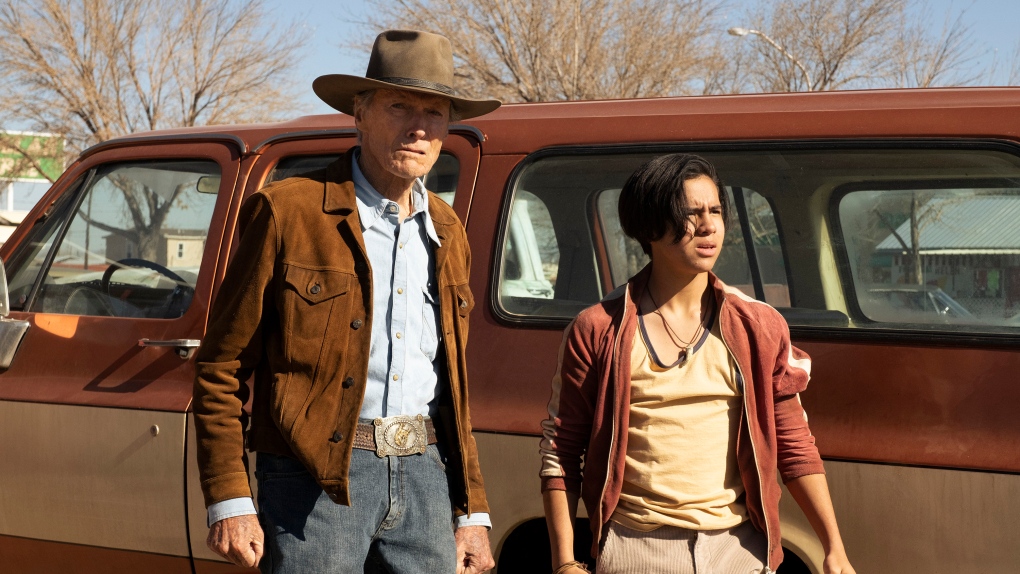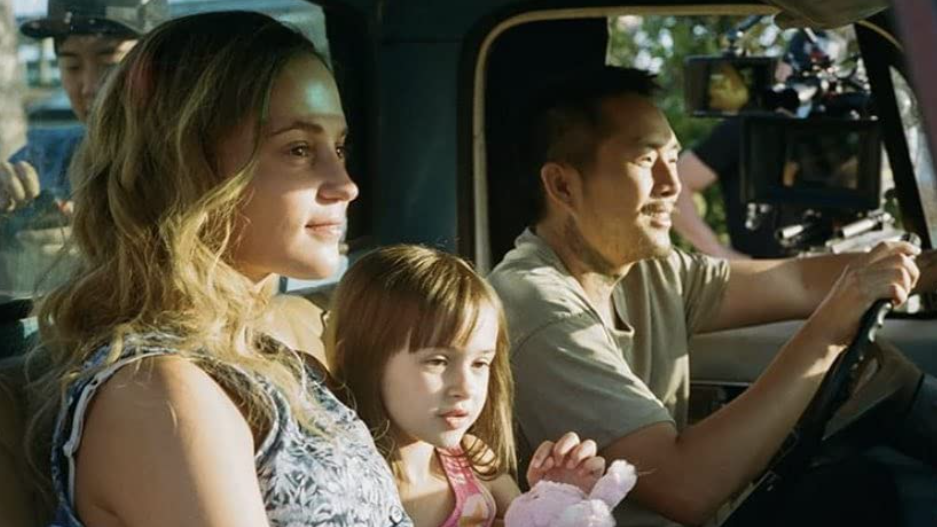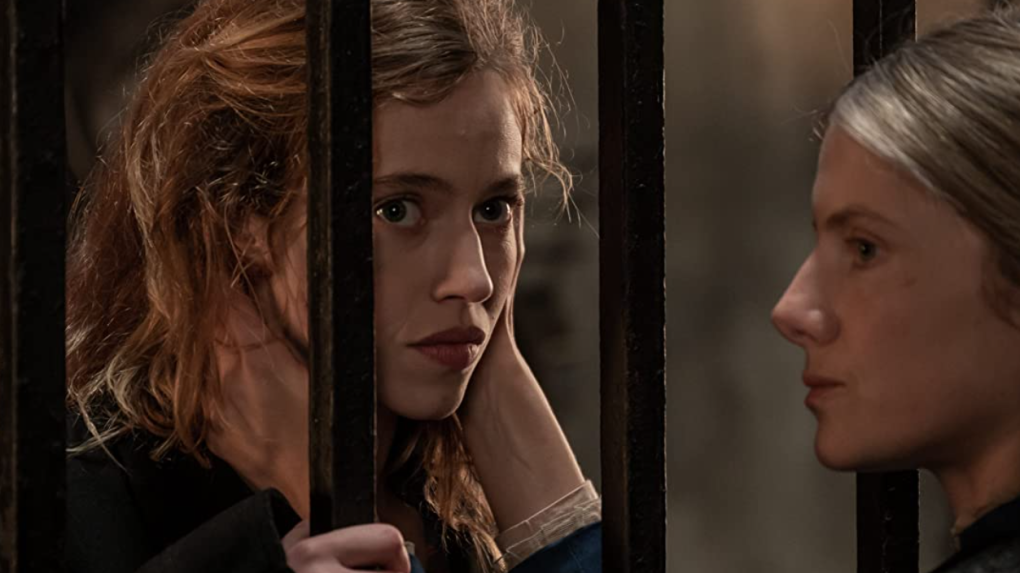
Grandparents killed in wrong-way crash on Hwy. 401 identified
A 60-year-old man and a 55-year-old woman killed in a wrong-way crash on Highway 401 earlier this week have been identified by the Consulate General of India in Toronto.
 This image released by Warner Bros. Pictures shows Clint Eastwood, left, and Eduardo Minett in a scene from "Cry Macho." (Claire Folger/Warner Bros. Pictures via AP)
This image released by Warner Bros. Pictures shows Clint Eastwood, left, and Eduardo Minett in a scene from "Cry Macho." (Claire Folger/Warner Bros. Pictures via AP)
Clint Eastwood is a legendary in Hollywood for his no-nonsense approach to filmmaking. He’s not Stanley Kubrick who would do 200 takes of a head turn, or Christopher Nolan whose camera technique is sharp as a tack. His unfussy approach to storytelling often gives his films a unique energy all their own, a style born out of confidence and almost 70 years of standing in front of or behind a camera.
Depending on your level of cynicism, “Cry Macho,” his new road trip movie now playing in theatres, is either the work of a filmmaker so confident in his craft he trusts the audience will follow him wherever he goes, no matter how meandering, or a slender, slapdash exercise in myth building.
Set in 1979, the story begins when wealthy Texas ranch boss (Dwight Yoakam) calls in a favour from former employee Mike Milo (Eastwood). He wants the former rodeo star and ranch hand to travel to Mexico, find his estranged thirteen-year-old son Rafo (Eduardo Minett) and bring him back to the States. The boy’s mother (Fernanda Urrejola) is an aristocratic woman with a short temper who seems to care nothing about her son.
“Take him if you can find him,” she hisses. “He’s a monster.”
Mike tracks down Rafo at a cockfight, where he is about to put Macho, his prizewinning rooster, into the ring.
“He is not a chicken,” Rafo says, “he’s Macho.”
The boy agrees to head to the States with Mike, excited at the prospect of becoming a real cowboy on his father’s ranch.
Along the way the surrogate father and son duo hide out from the Federales, meet a kind-hearted cantina owner (Natalia Traven) and learn the true meaning of what it means to be macho.
Based on a neo-Western book by N. Richard Nash that Eastwood has been circling around for decades, “Cry Macho” isn’t story driven as much as it latches onto the framework of the road trip genre to find momentum. It’s a low energy film that is more character study of a man forced to reassess the way he has lived his life.
“This macho thing is overrated,” he says.
The movie’s meta aspect is its strongest feature. Eastwood has spent his career as a personification of machismo, and now, at a frail-looking 91 years-old, he is making a comment not only on his character Mike, but of all the characters he has played before.
It’s hard to watch “Cry Macho” without picturing “The Outlaw Josey Wales” or “The Unforgiven,” and those memories colour every frame of the new film.
Unfortunately, those reminders may also make you nostalgic for the days of “The Outlaw Josey Wales” and “The Unforgiven.” “Cry Macho” has compelling ideas at its core, but is marred by Minett’s emotive performance, direction that feels directionless and the most laughably inept henchman in the history of film. Eastwood is stately, a lion in winter, but the film feels unambitious, lacking in the drama that would have made its messages on masculinity more potent.
Director Joe Carnahan's films are usually high octane, ultraviolent affairs that don't spare the blood or the bullets. His latest, "Copshop," now playing in theatres, walks a similar path but doesn't forget to bring the fun along for the journey.
Set in Nevada, much of the action takes place at the sleepy Gun Creek Police Department. Earlier in the evening con artist Teddy Murretto (Frank Grillo) was arrested after he sucker-punched Officer Valerie Young (Alexis Louder) outside a casino. He's a bad guy who should be avoiding the police, but circumstances forced his hand because an even worse guy, hitman Bob Viddick (Gerard Butler), had tracked him down.
The quick-thinking con man figures Viddick won't go near him if he's in jail.
He figured wrong.
Turning the tables on Murretto, Viddick manages to get himself brought in on a bogus drunk driving charge. The hunted and the hunter are now just one cell apart. Young knows something nefarious is going on, and is determined to get to the bottom of it, even if Murretto warns her to keep her nose of his business.
"This is way beyond anything you want to get involved in lady," he says. "You don't understand."
"No," she replies, "you don't understand how incredibly bored I am."
"Copshop" has echoes of "Assault on Precinct 13." Like the 1976 drama, most of the action happens inside the station and the cops and baddies must work together to find safety. The barebones storytelling builds quiet tension before Toby Huss shows up as sadistic killer Anthony Lamb. He's quick with a bullet and a one-liner. Eyeing Teddy's tight manbun he jokes, "You look just like Tom Cruise in that samurai movie nobody watched."
Huss chews the scenery, breathing life into a man who brings death. He's a hoot, simultaneously menacing and just a bit ridiculous.
Grillo and Butler are perfectly matched adversaries. They are the source of the cat-and-mouse plot; character actors laying the groundwork for the events that are the movie's engine. Just as impressive is Louder as the no-nonsense Young. She's at the centre of the movie, the one character everyone will root for.
"Copshop" is a simple b-action movie that feels like a holdover from the 1970s. There are some generic elements, like side characters who seem to have walked straight out of Central Casting, but Carnahan makes up for that with energy, suspense and a dark sense of humour.
 Alicia Vikander, Sydney Kowalske, and Justin Chon are seen in the film "Blue Bayou." (Entertainment One)
Alicia Vikander, Sydney Kowalske, and Justin Chon are seen in the film "Blue Bayou." (Entertainment One)
“Blue Bayou,” a new immigration drama starring Justin Chon and Alicia Vikander, tells a fictional, but all-too-true, story that is sincere but heavy-handed.
Written, directed and starring Chon, the story takes place in the Louisiana bayou. Chon plays the Korean-born Antonio LeBlanc, adopted by an American family when he was three. Now married to Kathy (Vikander) he’s raising step-daughter Jessie (Sydney Kowalske) with another child on the way.
A loping Cajun twang disguises the anxiety he feels with a new baby coming, but not enough money coming in. His two felonies make it tough to find extra work, and his job as a tattoo artist does not cover the bills. Still, the family is happy, even if Jessie is concerned Antonio, the self-proclaimed “fun” parent, won’t spend time with her when the new baby arrives.
A little spat between Kathy and Antonio in a grocery escalates when Ace, a cop and her ex-husband, and his violent partner (Emory Cohen) get involved. Antonio is arrested. When Kathy attempts to pay his bail, she’s told, matter-of-factly, “He’s not here anymore. ICE took him.”
Seems his adoptive parents didn’t follow the proper procedures to make him a citizen, and now, after thirty years in America, he may have to return to a country he doesn’t remember.
“I understand your frustration,” says the lawyer (Vondie Curtis-Hall) the couple hire, but can’t afford.
“Depart voluntarily,” he continues, “and have a chance to get back in. You can fight, but if you lose, you can never come back.”
“I’m not leaving my family,” Antonio replies.
“Blue Bayou” has much going for it. Chon has a poetic eye for visuals and frames the hot-button story nicely. There are enough details about the family to make us care about them and Antonio’s backstory adds some mystery to the proceedings. The chemistry between the core group—Antonio, Kathy and Jessie—feels genuine—Kowalske is a real find—and, as the immigration situation spins out of control, we’re along for the ride. But as the story gets heavier, so does the story-telling. Like leaden.
Chon’s characters are so compelling and much of the tale so heartfelt, that it’s a disappointment when the movie turns to melodrama in its final third. Nuance goes out the window and the quiet naturalism of the first half disappears. Add to that a villain in the form of Cohen’s bad cop character who seems to have wandered in from a British pantomime and you’re left with a case of the let-downs.
“Blue Bayou” details a very important, and for many people, very personal story, but falls victim to ham-fisted storytelling.
 Lou de Laage and Melanie Laurent are seen in the film The Mad Women's Ball. (Legende Films)
Lou de Laage and Melanie Laurent are seen in the film The Mad Women's Ball. (Legende Films)
“The Mad Woman’s Ball,” a new Gothic, French language thriller now streaming on Amazon Prime, is a human look at the dehumanizing oppression foisted upon patients at Paris’s notorious 19th century Pitié-Salpêtrière psychiatric hospital.
Young socialite Eugénie Cléry’s (Lou de Laâge) father is not happy. Her rebellious behaviour, like sneaking off to read poetry and smoke at cafes, offends his deeply conformist world view. Even worse is her newfound belief in spiritualism. Eugénie believes she can communicate with the dead. Those encounters leave her in a state of anxiety and cher vieux papa Cléry is having none of it. Embarrassed, he forcefully commits her to Pitié-Salpêtrière, a women’s hospital specializing in experimental treatments devised by Professor Jean-Martin Charcot (Grégoire Bonnet).
Diagnosed as “hysterical,” she finds solace in the company of Geneviève (Laurent), a sympathetic nurse who believes Eugénie doesn’t belong at the facility. Together they plan the young woman’s escape on the night of the hospital’s degrading “Bal des Folles,” (Mad Woman’s Ball) where Paris elite mix with the clinic’s patients.
An adaptation from the 2019 book by Victoria Mas, “The Mad Woman’s Ball” is a melodramatic story of survival set against the backdrop of the barbaric beginnings of psychiatric medicine.
Director Laurent paints an evocative picture of life inside the 19th century hospital. Laughs and screams fill the air as Laurent’s camera details the gothic details of the facility. On the inside, intimidation and oppression loom heavy, but the storytelling is compassionate. Eugénie and Geneviève are soldiers in the fight against fight against misogyny, personified by men like the arrogant Professor Charcot and Eugénie’s father, who oppress them and ultimately, misunderstand them.
It’s powerful storytelling, buoyed by wonderful performances, marred only by the occasionally overwrought contrivance.
“The Mad Woman’s Ball” is best in its quiet moments between Eugénie and Geneviève when the power of their solidarity is heightened.

A 60-year-old man and a 55-year-old woman killed in a wrong-way crash on Highway 401 earlier this week have been identified by the Consulate General of India in Toronto.
Three people have been arrested and charged in the killing of B.C. Sikh activist Hardeep Singh Nijjar – as authorities continue investigating potential connections to the Indian government.
Pius Suter scored with 1:39 left and the Vancouver Canucks advanced to the second round of the NHL playoffs with a 1-0 victory over the Nashville Predators on Friday night in Game 6.
TD Bank Group could be hit with more severe penalties than previously expected, says a banking analyst after a report that the investigation it faces in the U.S. is tied to laundering illicit fentanyl profits.
A Quebec man who pleaded guilty to threatening Prime Minister Justin Trudeau and Premier François Legault has been sentenced to 20 months in jail.
RCMP say human remains found in a rural area in central Saskatchewan may have been there for a decade or more.
A source close to singer Britney Spears tells CNN that the pop star is 'home and safe' after she had a 'major fight' with her boyfriend on Wednesday night at the Chateau Marmont in West Hollywood.
As Wegovy becomes available to Canadians starting Monday, a medical expert is cautioning patients wanting to use the drug to lose weight that no medication is a ''magic bullet,' and the new medication is meant particularly for people who meet certain criteria related to obesity and weight.
Drew Carey took over as host of 'The Price Is Right' and hopes he’s there for life. 'I'm not going anywhere,' he told 'Entertainment Tonight' of the job he took over from longtime host Bob Barker in 2007.

Alberta Ballet's double-bill production of 'Der Wolf' and 'The Rite of Spring' marks not only its final show of the season, but the last production for twin sisters Alexandra and Jennifer Gibson.
A British Columbia mayor has been censured by city council – stripping him of his travel and lobbying budgets and removing him from city committees – for allegedly distributing a book that questions the history of Indigenous residential schools in Canada.
Three men in Quebec from the same family have fathered more than 600 children.
A group of SaskPower workers recently received special recognition at the legislature – for their efforts in repairing one of Saskatchewan's largest power plants after it was knocked offline for months following a serious flood last summer.
A police officer on Montreal's South Shore anonymously donated a kidney that wound up drastically changing the life of a schoolteacher living on dialysis.
Since 1932, Montreal's Henri Henri has been filled to the brim with every possible kind of hat, from newsboy caps to feathered fedoras.
Police in Oak Bay, B.C., had to close a stretch of road Sunday to help an elephant seal named Emerson get safely back into the water.
Out of more than 9,000 entries from over 2,000 breweries in 50 countries, a handful of B.C. brews landed on the podium at the World Beer Cup this week.
Raneem, 10, lives with a neurological condition and liver disease and needs Cholbam, a medication, for a longer and healthier life.
 This image released by Warner Bros. Pictures shows Clint Eastwood in a scene from "Cry Macho." (Claire Folger/Warner Bros. Pictures via AP)
This image released by Warner Bros. Pictures shows Clint Eastwood in a scene from "Cry Macho." (Claire Folger/Warner Bros. Pictures via AP)